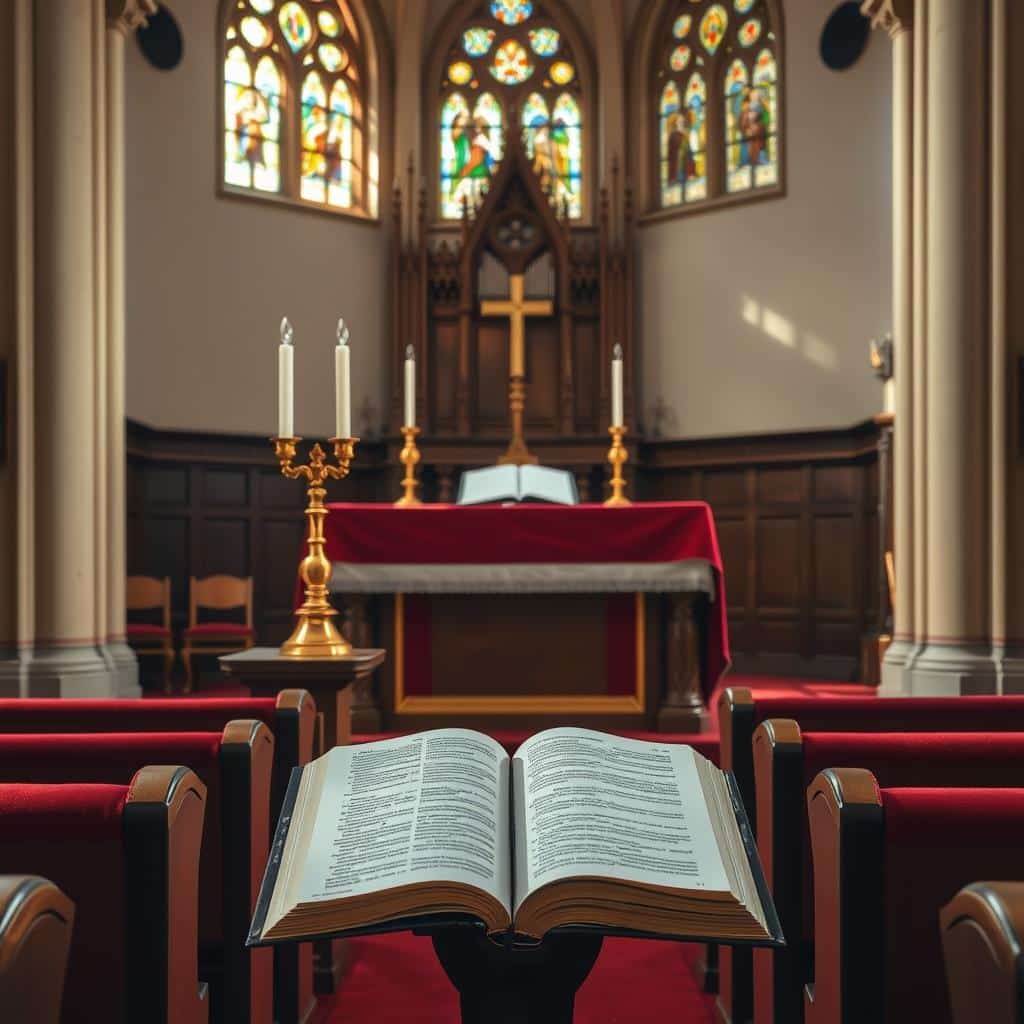The Scripture selections for this Sunday create a beautiful tapestry of divine-human dialogue. From Abraham’s bold negotiation with God in Genesis to Paul’s profound theology of baptism in Colossians, and finally to Luke’s account of Jesus teaching his disciples to pray, we witness the evolution of prayer across salvation history. These readings challenge us to examine our own prayer life while offering practical wisdom for deepening our conversation with God.

Scripture Readings for the Seventeenth Sunday in Ordinary Time, Cycle C
The liturgy for this Sunday presents us with three powerful readings that progressively reveal God’s relationship with humanity through prayer and covenant.
First Reading: Genesis 18:20-32
In this remarkable passage, we witness Abraham engaged in a bold negotiation with God over the fate of Sodom. Abraham’s intercession demonstrates both his deep reverence for God and his compassionate concern for others. Beginning with the question, “Will you sweep away the innocent with the guilty?” Abraham gradually reduces the number of righteous people needed to spare the city from fifty to ten.
This reading illustrates several key aspects of intercessory prayer: persistence, humility (“I am but dust and ashes”), and confidence in God’s mercy. Abraham approaches God not as a distant deity but as one with whom he can reason and plead. This sets the foundation for understanding the relationship between human petition and divine response that Jesus will later address in the Gospel.

Second Reading: Colossians 2:12-14
Paul’s letter to the Colossians provides a profound theological reflection on baptism as participation in Christ’s death and resurrection. He describes baptism as “a circumcision made without hands” that incorporates believers into Christ’s paschal mystery. Through this sacrament, our sins are forgiven as Christ “obliterates the bond against us.”
This reading connects to the theme of prayer by reminding us of our fundamental identity in Christ. Prayer flows from this baptismal identity—we pray as those who have died and risen with Christ. Paul’s imagery of having our “bond of debt” nailed to the cross emphasizes God’s generous response to our deepest need for forgiveness, which exceeds even what we might ask for in prayer.
Gospel: Luke 11:1-13
Luke’s account of Jesus teaching the Lord’s Prayer provides the centerpiece of this Sunday’s liturgy. When the disciples ask Jesus to teach them to pray, he offers both a model prayer and teachings about God’s generous response to our petitions. Luke’s version of the Lord’s Prayer is more concise than Matthew’s but contains the essential elements: reverence for God’s name, petition for the kingdom, request for daily needs, forgiveness, and protection from trial.
Jesus follows this prayer with two parables emphasizing persistence and God’s generosity. The friend at midnight illustrates that persistence in prayer reflects our trust in God’s goodness. The father giving good gifts to his children reveals that God gives not just what we ask for but what we truly need—ultimately, the Holy Spirit.

Theological Connections in the Seventeenth Sunday Readings
The readings for this Sunday reveal a progressive revelation about prayer across salvation history. From Abraham’s direct negotiation with God to Jesus’ teaching on prayer, we see an evolving understanding of how humans communicate with the divine.
The Evolution of Prayer
Abraham’s intercession represents an early form of prayer characterized by direct dialogue and negotiation. His approach demonstrates both reverence and familiarity with God. By the time of Jesus, prayer has become more formalized, yet Jesus reintroduces an intimate dimension by teaching his disciples to address God as “Father.” This progression shows how prayer in the Judeo-Christian tradition balances reverence with relationship.
Paul’s theology of baptism adds another dimension by grounding prayer in our identity as those united with Christ. We pray not merely as creatures to Creator but as adopted children to Father. This baptismal identity transforms prayer from petition to participation in divine life.
Divine Generosity and Human Persistence
A common thread through all three readings is the contrast between divine generosity and human persistence. Abraham persists in his negotiation, gradually reducing the number needed to save Sodom. Jesus teaches that we should “ask…seek…knock” with persistence. Yet both passages ultimately emphasize God’s exceeding generosity—God is willing to spare an entire city for the sake of a few righteous people, and gives the Holy Spirit to those who ask.
This theological tension invites us to consider: Why does God, who knows our needs before we ask, desire our persistent prayer? The readings suggest that prayer is not primarily about changing God’s mind but about transforming our hearts to align with God’s will and to recognize our dependence on divine grace.
Deepen Your Understanding of Biblical Prayer
Explore our comprehensive guide to prayer traditions from Abraham to Jesus with practical applications for your spiritual life.

Living the Message of the Seventeenth Sunday in Ordinary Time
The ACTS Prayer Model
The Lord’s Prayer provides a comprehensive model for our own prayer life. One practical way to apply this is through the ACTS model of prayer, which aligns with the elements Jesus included:
ACTS Prayer Framework
- Adoration: “Hallowed be your name” – Begin by praising God for who God is, not just what God does for us.
- Contrition: “Forgive us our sins” – Acknowledge areas where we have fallen short and seek forgiveness.
- Thanksgiving: Express gratitude for God’s provision (“Give us each day our daily bread”).
- Supplication: “Lead us not into temptation” – Present our needs and the needs of others to God.
Persistence in Prayer
Jesus’ parable of the friend at midnight teaches us about persistence in prayer. This doesn’t mean God is reluctant to respond but rather that persistence demonstrates our trust and commitment. Consider these practical applications:
Prayer Practices for Persistence
- Keep a prayer journal to track concerns and answered prayers
- Set aside regular times for prayer, even when you don’t “feel” like praying
- Form or join a prayer group for mutual support and accountability
- Use prayer beads or other aids to maintain focus during extended prayer
Overcoming Prayer Challenges
- When prayer feels dry, focus on God’s presence rather than emotions
- For distractions, gently return focus to prayer without self-judgment
- During busy periods, incorporate brief “arrow prayers” throughout the day
- In times of doubt, pray honestly about your struggles with faith
Intercessory Prayer
Abraham’s intercession for Sodom provides a powerful model for praying on behalf of others. Intercessory prayer acknowledges both human solidarity and divine mercy. Consider creating an intercessory prayer practice that includes:
- Praying for those with whom you disagree or who have hurt you
- Interceding for systemic issues of justice and peace, not just individual concerns
- Balancing specific requests with openness to God’s wisdom
- Following up with practical action where possible

Discussion Questions for Faith Groups
1. Prayer Persistence and Divine Response
Jesus teaches us to “ask…seek…knock” with persistence. Yet elsewhere he says God knows what we need before we ask (Matthew 6:8).
- Why does God want us to pray persistently if he already knows our needs?
- Share an experience when persistent prayer changed either your situation or your perspective.
- How do you balance persistence with acceptance of God’s will?
2. Baptismal Identity and Prayer
Paul describes baptism as being buried and raised with Christ, having our sins forgiven.
- How does your baptismal identity influence how you pray?
- What does it mean to pray as someone who has “died and risen with Christ”?
- How might remembering your baptism change your approach to daily challenges?
3. Intercessory Prayer and Justice
Abraham intercedes with God for Sodom, appealing to God’s justice and mercy.
- When have you felt called to intercede for others or for situations of injustice?
- How do you balance prayer for justice with action for justice?
- What communities or situations in our world today need our intercession?
Lead Meaningful Faith Discussions
Access our complete discussion guide with additional questions, scripture references, and facilitation tips.

Liturgical Elements for the Seventeenth Sunday in Ordinary Time
Opening Prayer
God our Father, you have blessed us with the gift of prayer through your Son Jesus Christ. Open our hearts to recognize your presence, our minds to understand your word, and our lives to respond to your call. As we reflect on these sacred readings, may we grow in our trust of your generous love and our commitment to persistent prayer. We ask this through Christ our Lord. Amen.
Suggested Hymns
Entrance
- The Lord is My Light
- Gather Us In
- All Are Welcome
Offertory
- Seek Ye First
- The Summons
- Prayer of St. Francis
Communion/Closing
- One Bread, One Body
- The Lord’s Prayer
- Go Make a Difference
Closing Prayer
Gracious God, as we conclude our reflection on your word, we thank you for teaching us to pray. May the example of Abraham inspire us to intercede boldly for others. May the teaching of Paul remind us of our baptismal identity. And may the words of Jesus guide us to pray with persistence and trust. Send us forth to be people of prayer and action in our world. We ask this through Christ our Lord. Amen.

Liturgical Note
The Seventeenth Sunday in Ordinary Time falls in the middle of Ordinary Time. Green vestments are worn, symbolizing growth and hope. This is an excellent opportunity to emphasize the universal call to prayer and the baptismal priesthood of all believers.
Additional Resources for the Seventeenth Sunday in Ordinary Time
For Personal Reflection
- Journal prompts based on the Lord’s Prayer
- Guided meditation on Abraham’s intercession
- Examination of conscience based on Colossians
- Prayer practice: lectio divina with Luke 11:1-13
For Families
- Child-friendly explanation of the Lord’s Prayer
- Family prayer ritual for Sunday dinner
- Creative activities to teach persistence in prayer
- Discussion starters about asking God for help
For Liturgical Ministers
- Homily notes highlighting prayer themes
- Petitions connected to the readings
- Environment suggestions for Ordinary Time
- Music selection guidance with thematic connections


Practical Takeaways from the Seventeenth Sunday in Ordinary Time
This Week’s Prayer Challenge
Commit to spending 5-10 minutes each day this week praying the Lord’s Prayer slowly, pausing after each phrase to reflect on its meaning for your life. Notice which parts of the prayer resonate most deeply with your current circumstances.
Daily Focus Points:
- Monday: “Our Father who art in heaven” – Reflect on God as Father
- Tuesday: “Hallowed be thy name” – Focus on reverence and adoration
- Wednesday: “Thy kingdom come” – Consider God’s vision for the world
- Thursday: “Give us this day our daily bread” – Reflect on dependence
- Friday: “Forgive us our trespasses” – Focus on reconciliation
- Saturday: “Lead us not into temptation” – Consider areas of struggle
- Sunday: Pray the entire prayer, integrating the week’s insights
Putting Faith into Action
Inspired by Abraham’s intercession for others, identify a situation of injustice or suffering in your community that needs both prayer and action. Consider these steps:
- Research to understand the root causes of the situation
- Commit to regular, specific prayer for those affected
- Identify one concrete action you can take (volunteering, advocacy, donation)
- Invite others to join you in both prayer and action
- Reflect on how this integrated approach deepens your faith
Remember
Prayer is not an alternative to action but its foundation. As we pray “thy kingdom come,” we commit ourselves to being instruments of that kingdom in our daily lives.

Embracing the Message of the Seventeenth Sunday in Ordinary Time
The readings for the Seventeenth Sunday in Ordinary Time, Cycle C offer us a rich tapestry of insights into prayer, persistence, and God’s generous response to our needs. From Abraham’s bold intercession to Paul’s profound theology of baptism to Jesus’ practical teaching on prayer, we are invited to deepen our relationship with God through consistent, honest communication.
As we move forward from this Sunday, may we carry these lessons into our daily lives: the courage to intercede for others like Abraham, the awareness of our baptismal identity as taught by Paul, and the persistence in prayer modeled by Jesus. Through these practices, we participate more fully in God’s kingdom and become channels of divine grace in our world.
Escape the Cycle of Reincarnation: Your Guide
Continue Your Spiritual Journey
Receive weekly reflections on the Sunday readings directly in your inbox, with practical applications for daily life.






